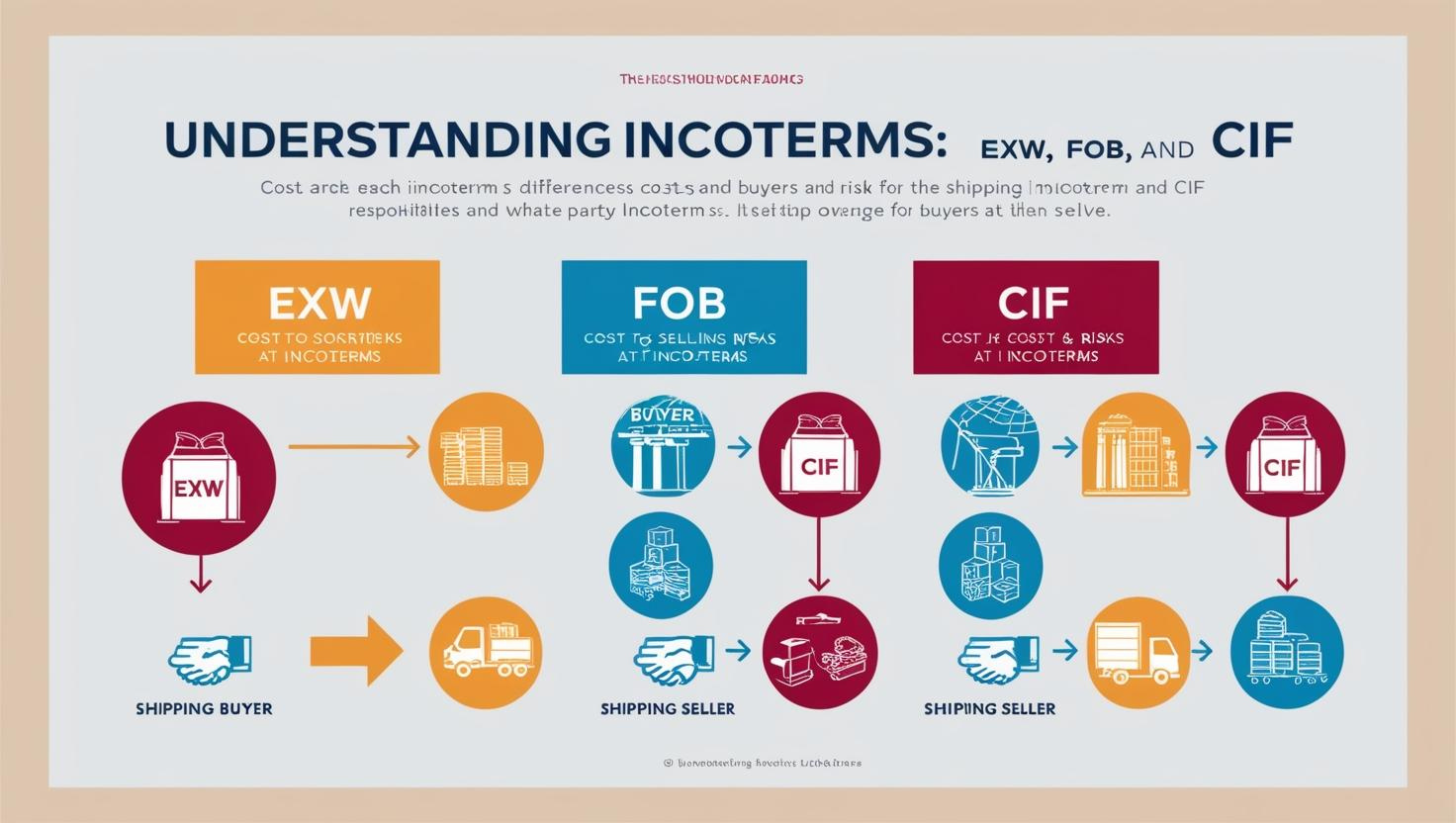
Navigating international trade can be complex, especially with terms like EXW, FOB, and CIF. These terms define the responsibilities, costs, and risks for buyers and sellers. Understanding these differences is crucial for smooth transactions.
EXW, FOB, and CIF1 differ in who bears costs and risks during the shipping process. Knowing these terms helps buyers and sellers negotiate better.
Clear knowledge of these terms enables procurement buyers to make informed decisions and avoid disputes.
What is EXW in shipping terms?
EXW (Ex Works) is one of the simplest Incoterms, where the seller provides goods at their premises, and the buyer handles all transport and costs.
Under EXW2, the buyer assumes full responsibility for transportation and risks from the seller’s premises.
Understanding EXW is essential for buyers who prefer maximum control over the shipping process.
Responsibilities in EXW
| Responsibility | Seller | Buyer |
|---|---|---|
| Packaging | Yes | No |
| Loading on vehicle | No | Yes |
| Export clearance | No | Yes |
What is the meaning of EXW, FOB, CIF, DDP?
These Incoterms outline varying levels of buyer and seller responsibilities. They are used to negotiate and manage international shipping effectively.
EXW, FOB, CIF, and DDP3 define how costs and risks are shared in international trade.
For instance:
- EXW: Seller hands over goods at their premises.
- FOB: Seller delivers goods to the port, buyer takes over from there.
- CIF: Seller manages freight and insurance to the buyer’s destination port.
- DDP: Seller assumes all responsibilities until goods reach the buyer.
What is the difference between EXW and CIP?
CIP (Carriage and Insurance Paid) is more comprehensive than EXW, where the seller covers transportation and insurance up to a specified destination.
The key difference between EXW and CIP4 lies in the seller’s responsibility for transportation and insurance.
While EXW favors buyers with shipping control, CIP offers added security with insurance coverage.
Comparison Between EXW and CIP
| Aspect | EXW (Ex Works) | CIP (Carriage and Insurance Paid) |
|---|---|---|
| Transport | Buyer arranges all | Seller arranges up to destination |
| Insurance | Buyer responsibility | Seller provides insurance |
What is the difference between FOB and CIF Incoterms?
FOB (Free On Board) and CIF (Cost, Insurance, Freight) differ in terms of who manages the freight and insurance.
Under FOB and CIF5, the seller’s responsibility ends when goods are loaded on the ship in FOB, while in CIF, the seller covers freight and insurance to the destination port.
Buyers often prefer FOB for cost control, while CIF is ideal for convenience.
FOB vs. CIF
| Aspect | FOB | CIF |
|---|---|---|
| Freight | Buyer | Seller |
| Insurance | Buyer | Seller |
| Risk Transfer | At port of loading | At port of destination |
What is the difference between EXW and Incoterms?
EXW is a specific Incoterm that outlines minimal seller responsibility, making it unique within the broader category of Incoterms.
EXW vs. Incoterms6 focuses on how EXW sets the baseline for seller responsibilities compared to other terms.
For buyers seeking control, EXW offers simplicity, while other terms like CIF and DDP provide additional seller involvement.
EXW in the Context of Incoterms
| Aspect | EXW | Other Incoterms |
|---|---|---|
| Seller Responsibility | Minimal | Varies (freight, insurance, duties) |
| Buyer Responsibility | Maximum | Varies |
Conclusion
Understanding the differences between Incoterms like EXW, FOB, and CIF helps buyers and sellers manage costs, risks, and responsibilities effectively.
-
Detailed explanation of EXW, FOB, and CIF Incoterms. ↩
-
Overview of EXW (Ex Works) shipping terms and usage. ↩
-
Comprehensive guide to EXW, FOB, CIF, and DDP responsibilities. ↩
-
Key differences between EXW and CIP Incoterms. ↩
-
Comparison of FOB and CIF responsibilities in international trade. ↩
-
Analysis of EXW in the broader context of Incoterms. ↩


